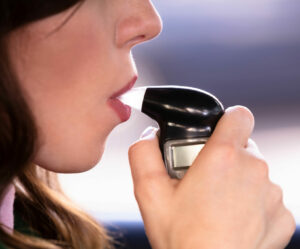
One of the most common questions we get when a client reaches out after having been pulled over is whether or not they should submit to a breathalyzer test. As you might imagine, the answer to that question is more complex than simply yes or no. So what factors go into this decision, and what should you do if you are being asked to submit to a breathalyzer test? We answer those questions and more in today’s blog.
Should I Take The Breathalyzer?
Again, we’re not going to be able to provide you with a definitive answer either way for every situation, but we want to give you some information to help you make your decision. For starters, the only time we always recommend blowing into the breathalyzer is if you have not had a drop of alcohol that day. If you know for a fact that you are sober, go ahead and submit to the roadside test. You will have nothing to worry about when it comes to alcohol in your system, although there may be other legal issues related to your traffic stop. But if you know for a fact that you’re completely sober, go ahead and take the portable breath test.
If there’s even a possibility that you could blow over the legal limit, you’ll want to understand what’s at stake. For starters, if you take the test and blow a 0.08 or above, you’ll be arrested for driving under the influence. Even if you blow just under the legal limit, if the officer feels that alcohol in influencing your ability to drive safely, you can be arrested. There’s a lot of risk associated with taking the test.
If you refuse the test, the officer will likely have enough evidence based on the interaction and your refusal in order to place you under arrest for suspicion of driving under the influence. This may sound like the worst outcome, but that’s certainly not always the case. If you’re going to blow over the legal limit, you’re only handing more evidence to police. Refusing to take the portable breath test will not cause you any additional issues than you would face if you were to blow above a 0.08. You’ll be placed under arrest and taken down to the police station.
Refusing to take an official breath test at the station will result in additional consequences. Refusing an official breath test during the course of a DWI investigation is a crime in and of itself, and you’ll be charged with an Implied Consent violation. This will trigger the immediate loss of your driver’s license, and you may still face DWI charges. It may sound like a no brainer to submit to the official test, but again, if you know you’re over the legal limit, it may only make it harder to beat the DWI charge. You’ll avoid an Implied Consent charge in the process, but if you end up convicted for DWI, you’ll likely lose your license for an extended period anyways.
If you’re unsure of what you should do, you should ask to be able to contact a lawyer. You are legally allowed to consult with a lawyer once the interaction reaches a critical point, and the decision to blow into a breathalyzer is considered a critical juncture. Your lawyer may not provide a specific yes or no answer, but based on this information and the details of your incident, you should be able to come to a decision that avoids a worst case scenario.
At the end of the day, the answer is, “it depends.” Make sure you contact a lawyer for more individualized advice prior to making your decision about submitting to a breathalyzer. To connect with a lawyer who can help, give Avery and the team at Appelman Law Firm a call today at (952) 224-2277.





